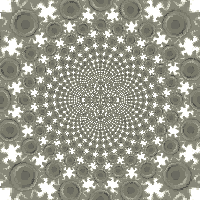

Clockwork Universe :
The 17th century was a time of intense religious feeling, and nowhere was that feeling more intense than in Great Britain. There a devout young man, Isaac Newton, was finally to discover the way to a new synthesis in which truth was revealed and God was preserved.
Newton was both an experimental and a mathematical genius, a combination that enabled him to establish both the Copernican system and a new mechanics. His method was simplicity itself: "from the phenomena of motions to investigate the forces of nature, and then from these forces to demonstrate the other phenomena." Newton's genius guided him in the selection of phenomena to be investigated, and his creation of a fundamental mathematical tool--the calculus (simultaneously invented by Gottfried Leibniz)--permitted him to submit the forces he inferred to calculation. The result was Philosophiae Naturalis Principia Mathematica (Mathematical Principles of Natural Philosophy, usually called simply the Principia), which appeared in 1687. Here was a new physics that applied equally well to terrestrial and celestial bodies. Copernicus, Kepler, and Galileo were all justified by Newton's analysis of forces. Descartes was utterly routed.
Newton's three laws of motion and his principle of universal gravitation sufficed to regulate the new cosmos, but only, Newton believed, with the help of God. Gravity, he more than once hinted, was direct divine action, as were all forces for order and vitality. Absolute space, for Newton, was essential, because space was the "sensorium of God," and the divine abode must necessarily be the ultimate coordinate system.
Mechanics came to be regarded as the ultimate explanatory science: phenomena of any kind, it was believed, could and should be explained in terms of mechanical conceptions. Newtonian physics was used to support the deistic view that God had created the world as a perfect machine that then required no further interference from Him, the Newtonian world machine or Clockwork Universe. These ideals were typified in Laplace's view that a Supreme Intelligence, armed with a knowledge of Newtonian laws of nature and a knowledge of the positions and velocities of all particles in the Universe at any moment, could deduce the state of the Universe at any time.
To the eighteenth and much of the nineteenth centuries, Newton himself became idealized as the perfect scientist: cool, objective and never going beyond what the facts warrent to speculative hypothesis. The Principia became the model of scientific knowledge, a synthesis expressing the Enlightenment conception of the Universe as a rationally ordered machine governed by simple mathematical laws. To some, even the fundamental principles from which this system was deduced seemed to be a priori truths, attainable by reason alone.
Excerpt from the Encyclopedia Britannica without permission.